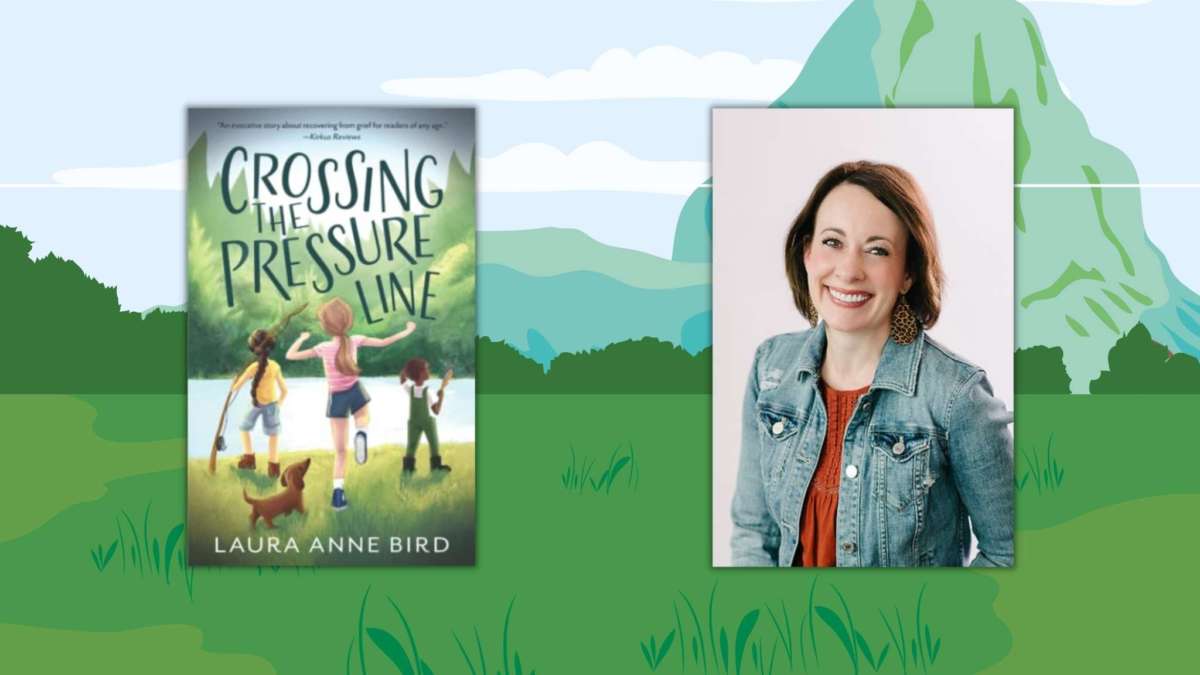“I wanted to show kids that it’s OK to feel like a wad of playdough, being smooshed in one direction and then the other. It’s a huge part of the human experience — and it’s ultimately how we become resilient.”
That’s Laura Anne Bird, talking about the protagonist Clare in her poignant novel for middle-grade readers, Crossing the Pressure Line (our review). The author was commenting on what she hopes is one of the key takeaways in her story about a twelve-year-old girl coming to terms with some changes in her life that all kids must deal with — and the pain and difficulties in doing so.
“I think it’s so important to be open and honest about our big feelings and vulnerabilities,” Bird says, referring to Clare’s experience. “No one benefits when we sweep them under the rug.”
In a recent Q&A, we got to learn more about the author and some of the important themes she addresses in this powerful and very readable story.
Q: A key theme in your book Crossing the Pressure Line is a young person having to deal with the loss of a dear relative. What lessons are conveyed in the story about this theme?
A: Clare’s loss of her grandfather is devastating, but I think it mirrors the grief of many children (and grown-ups) after being stuck in a pandemic for more than two years. I wanted Clare to undergo significant growth and find a new sense of hope and purpose, because every single one of us is required to do that at some point in life.
Q: The book is geared for middle-grade readers, ages 8-12 — a period when children are transitioning, growing and trying to figure things out. What are some of the challenges of this time in their development?
A: I acutely remember the push-and-pull of that developmental stage — and I’ve also watched my son and two daughters go through it. You want to feel independent, but you still want the comfort and reassurance of your family. You want to stand out from the crowd, but you still want to fit in. It’s like playing a game of tug of war with yourself.
On top of these major social and emotional shifts, many tweens struggle to find confidence in their own bodies, which was a challenge for me, too. I wanted Clare to model a different way of being. Even though she’s not the fastest or the strongest, she develops a powerful mind-body connection and sense of agency. Together, these things allow her to become a mighty force. I think tweens need to be reminded that they are capable of that. I certainly would’ve benefited from hearing this message at age 12.
Q: What role does “courage” play in the development of middle-grade readers?
A: The idea of “courage” is unique to each child, because what stretches and challenges one tween is going to be very different from what stretches and challenges another. At its core, I think being brave means doing exactly what you think you cannot. It’s setting big, bold goals for yourself and chunking them out so they become achievable — even if you’re terrified.
Q: What is meant by this quote in your book: “Many men go fishing all their lives without knowing that it is not fish they are after.”
A: That line is from Henry David Thoreau, and I love it.
Clare sets a goal of catching a musky to honor her late grandfather, who was never able to catch one himself. But her pursuit ends up going far beyond the actual fish. Clare does it “for the challenge, for the hard work and exercise, for the agony and the triumph and the peace.” She understands that there are no guaranteed results when fishing, so she searches for meaning in the process itself.
Q: Tell us about the main character, the young girl Clare, and who if anyone she is modeled after.
A: Clare is a deeply reflective twelve-year-old who grieves the untimely loss of her grandfather, puts her self-confidence to the test, and learns to listen to the courageous voice inside.
Clare’s superpower is her ability to remain calm in the face of big challenges. Although I did not model her after anyone specific, I do admire the way she responds so thoughtfully to stressful situations. I wish I was better at that myself.
Q: Nature plays a big part in your story. Describe its significance and what in your own background inspired it.
A: Crossing the Pressure Line is about identifying the lifeboats that have the power to save us during turbulent times. One of my own personal lifeboats is nature. I spend time outdoors every day, even when the temperature dips below zero, which happens frequently in Wisconsin in winter. Whether in my hometown of Madison, or in the Northwoods, or in the Driftless Area (Google it — it’s the coolest!), I’m happiest when I’m breathing fresh air.
In my book, I wanted to celebrate a sense of wonder and reverence for the natural world, which I think is essential in these times of cell phones, social media, and virtual everything. Go outside, get dirty, move your body, sweat! You’ll experience a rush of endorphins while recharging your battery.
https://booktrib.com/wp-content/uploads/2022/05/lab-200×305.jpg
About Laura Anne Bird:
A Milwaukee native, Laura Anne Bird graduated from the University of Notre Dame with a degree in English. She lives in Madison with her husband, three teenagers, and little blind dachshund. When she’s not reading, writing, or reviewing books, she loves to exercise and explore the outdoors. Crossing the Pressure Line is her first novel.




